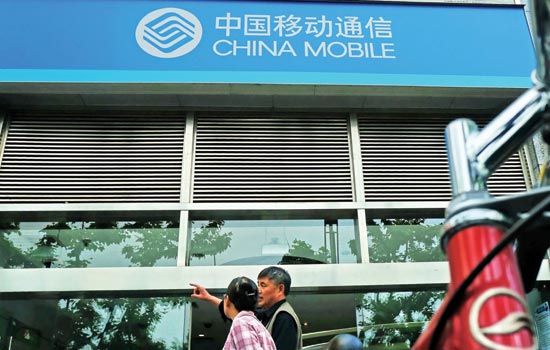|
 |
|
A China Mobile Ltd branch in Shanghai. Through the company's terminals, the telecom giant aims to provide at least 1 billion items of public information this year, covering nine segments including airline tickets, education, entertainment and coupons. [Photo/China Daily] |
China Mobile Ltd, the world's biggest telecom operator by user numbers, aims to have 50 million users for its "Wireless City" project by the end of this year, up from just 17 million in April, according to officials from China Mobile.
The project, which started in the coastal city of Xiamen, Fujian province, in 2008, aims to provide the public with information and services on mobile terminals, Li Zhengmao, an executive vice-president at China Mobile, told China Daily.
It also aims to help improve the management of local governments.
In Xiamen, for example, people will be able to use mobile phones to access public transport information. By April, the application had been used 4.5 million times.
It helped people cut their waiting time by more than 60 percent and reduced the city's traffic congestion by 20 percent, the company said.
People in Jinan, capital of Shandong province, can log into the Wireless City portal through mobile devices and pay household electricity or water fees.
China Mobile said that by April, 302 cities had opened wireless urban portals, with 16,000 applications running on them.
The cumulative number of unique users reached 17 million in the period.
Li said the company plans to build an integrated management platform in Guangdong for its Wireless City project by the end of this year, and offer a unified user interface for all of the nation's wireless city portals.
China Mobile also aims to provide at least 1 billion items of public information this year, covering nine segments including airline tickets, education, entertainment and coupons.
Li Yue, China Mobile CEO, said building the Wireless City will be the company's top task during the nation's 12th Five-Year Plan (2011-15).
"Networks, platforms and applications are the elements that will determine the success of the Wireless City project," Li Yue said at the China Mobile Global Developers Conference in Guangzhou last December.
|
|
China Mobile is pursuing a "four-network coordinated development" strategy as it builds up wireless cities. The 2G, 3G and 4G mobile networks, together with wireless local area networks, have created a seamless mobile connection environment.
China Mobile is among the handful of the world's telecom carriers that offer wireless connections to the public and introduce public service applications.
Most telecom companies around the world are reluctant to carry out such projects because of the long time it takes to recoup their costs.
Singapore Telecommunications Ltd, Southeast Asia's biggest telecoms firm, joined a "Wireless Singapore" plan in 2006. The company has so far offered 1,600 public service applications and has a user base of 1.3 million.
However, earlier trials of wireless cities elsewhere, including the United States, mostly failed. Those efforts included one by Philadelphia in 2004, and another by San Francisco in 2006.
"Those failures indicated that the build-up of wireless cities is a long-term, continuous process. It challenges companies' operating ability," said Li Zhengmao.
Early trials only offered wireless connections but no applications, which didn't match the goal of setting up a long-term operating mechanism, he said.
"Accompanying the data traffic explosion and the rapid spread of smartphones, the Wireless City project is going to be an important revenue source for China Mobile," he added.
shenjingting@chinadaily.com.cn
